PC Gamer is supported by its audience. When you buy through links on our site, we may earn an affiliate commission. Learn more
By published
What a motherboard! ASRock’s Z690 Aqua stuns with its attention to detail but its $1,400 price tag means it has little relevance out in the real world.
What a motherboard! ASRock’s Z690 Aqua stuns with its attention to detail but its $1,400 price tag means it has little relevance out in the real world.
Stunning build quality and attention to detail
Mega VRM
Dual Thunderbolt 4
It’s $1,400. Seriously
Only three M.2 slots
Back up VRM heatsinks would be nice
We’ve covered several high end Z690 gaming motherboards on PC Gamer—including ASRock’s own pricey Z690 Taichi—but that ol’ $590 Taichi is downright cheap in comparison with the board I have in front of me right now. Y’see, there’s a new, exclusive set of halo boards with the $1,400 ASRock Z690 Aqua sitting at the head of the pack. What do we call them? Ultra high-end? Ultra enthusiast? Hyper high-end? Faintly ridiculous? Whatever you want to call boards well north of $1,000, it’s absolutely the category the Z690 Aqua belongs in.
The ASRock Z690 Aqua joins the Asus Maximus Extreme Glacial, Aorus Xtreme WaterForce, and MSI Godlike in this bizarre crew of elaborately named and priced boards. They’re all sold for well above a level that 99.9% of the market would even consider appropriate.
But these simply aren’t boards designed for the mass market. Some people have more money than others. It’s the way of the world, and clearly there’s demand for limited edition, premium products such as the Aqua. Such motherboards are ‘look at what we can do’ statements from the manufacturers, and ‘look how much cash I can splurge’ statements from buyers.
It’s like the engineers and designers were given a blank slate to see what they can come up with, and price be damned. I get the feeling that ASRock’s designers and engineers would be proud of themselves, and why shouldn’t they be?
Once you get past the sticker shock, there’s no doubt that the Z690 Aqua is a work of motherboard art. It’s limited to a run of just 500 units, though our particular sample isn’t counted as one of them. Instead of a number adjacent to the chipset heatsink, our review sample comes with unique PC Gamer naming. Cool. We special.
Socket: Intel LGA 1700
CPU compatibility: Intel 12th Gen
Form factor: EATX
Memory support: Up to DDR5-6400+(OC), Up to 128GB
Storage: 3x M.2; 8x SATA
USB: Up to 2x Thunderbolt 4, 4x USB 3.2 Gen2x2, 2x USB 3.2 Gen 2, 8x USB 3.1 Gen 1, 4x USB 2.0
Display: 1x HDMI, 2x DP 1.4 inputs
Networking: Intel Wi-Fi 6E; Aquantia AQC113CS 10G LAN, Killer E3100G 2.5G LAN
Audio: Realtek ALC1220 7.1 Channel HD Audio
Price: $1399
We begin with a look at the packaging and accessories. The box is huge and it’s heavy. The overall design and even the fonts used add minimalistic class. Underneath the motherboard tray is an accessory layer, divided up into four separate sections. There’s the usual inclusions, such as SATA cables, Wi-Fi antennas and manuals, but then there’s water leak detector compete with a digital readout. Impressive! Asrock also include thermal paste and spare thermal pads.
Now we get to the motherboard itself, and what a beauty. All that metal looks space age, and it’s not just on the front, the rear is covered by a full backplate, too. The board includes three M.2 slots, all of which support PCIe 4.0 x4. One of them is positioned to the right of the memory slots. That’s an area we like to see M.2 slots as its located well away from a heat-dumping GPU.
Would a fourth M.2 slot have been nice given that some boards support up to five? Perhaps, but to make up for that, the board includes eight SATA ports, something that’s becoming increasingly rare these days as SATA falls out of favour.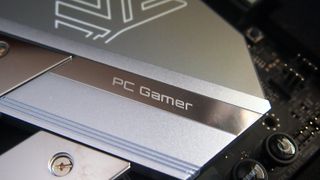
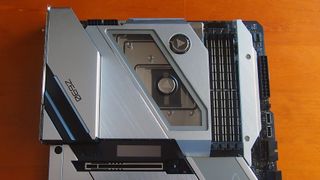
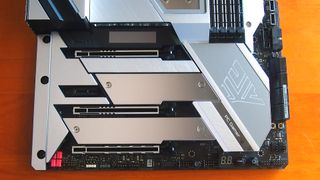
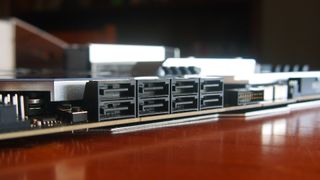
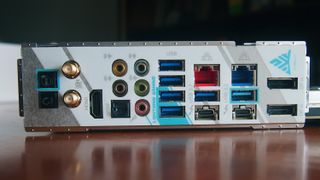
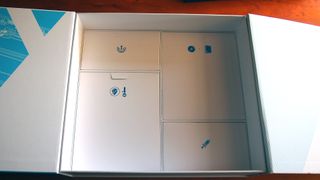
All in, there’s a fantastic amount of expansion support.
One of the really cool inclusions is a small OLED display that shows various system information such as temperatures and voltages. There’s a couple of splashes of RGB atop the rear I/O section and the chipset heatsink. If you do buy a motherboard such as this, we hope you’ll show it off. Placing it inside a case never to be seen would be a crime.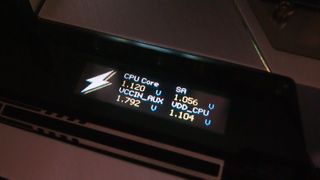
Our ageing 240mm custom water cooling setup is not optimal for a high performance 2022 CPU. A VRM test, consisting of 20 minutes of Cinebench looping delivered a 55°C VRM temp that was still rising gradually due to constantly increasing liquid temperatures. If you have a better radiator and pump, it’s unlikely your VRM temperatures will be that high. Not that 55°C is anything to worry about, either.
On the subject of the VRM, I’d like it if ASRock could bundle a couple of basic VRM heatsinks for if you do need to run it with air or AIO cooling. Of course, we know this is a board that’s designed for custom water cooling, but a couple of dollars worth of heatsinks at this price wouldn’t hurt ARSock’s bottom line.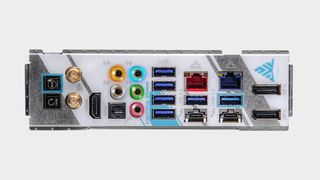
When it comes to networking, the Aqua is about as good as it gets for a consumer level board. Though at this price, you’d expect nothing less. There’s Intel Wi-Fi 6E, Killer E3100G 2.5G LAN and Aquantia AQC113CS 10G LAN rounding out the network options.
Now that the 12th Gen platform has had time to mature, it’s no surprise to see most motherboards performing within just one or two percent of one another. The Z690 Aqua is what we’d call a 1.5th generation board. It arrived a few months after the first wave of boards, which means its BIOS should be mature right out of the box, unlike some early boards that struggled a bit with memory compatibility.
In system benchmarks, the board performed as expected. It did quite well in the Cinebench R23 test though in reality the boards are all within a margin of error.
System performance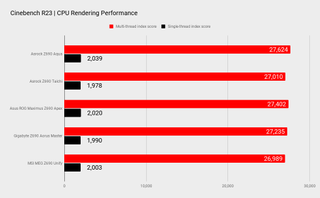
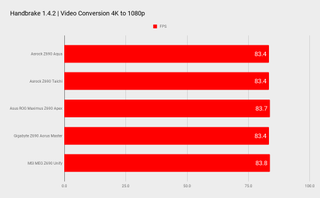
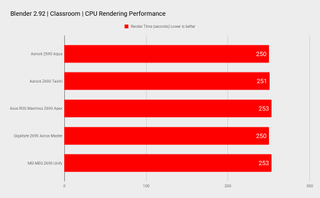
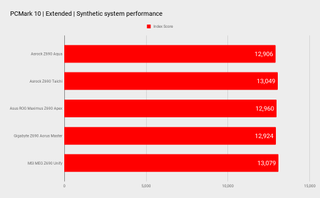
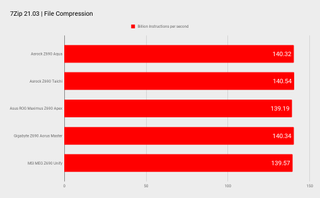
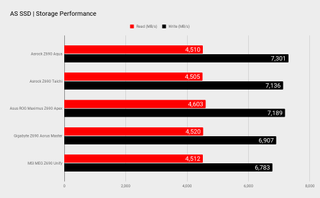
Gaming performance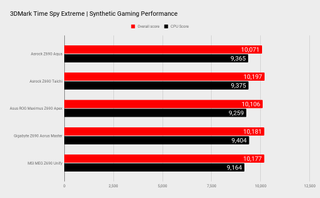
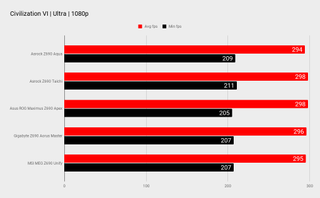
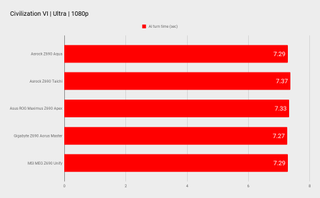
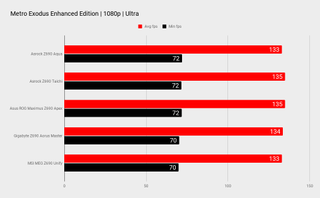
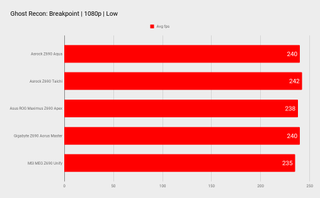
Our CPU runs into its own cooling limitations well before the board is even remotely stressed, and therefore the capabilities of your own CPU will be the determining factor.
But it’s a different story when it comes to memory overclocking.
To get the best out of your RAM, a good board is a must and the Aqua absolutely delivers. We were able to achieve a devilish 6666MHz at 36-38-38 at 1.45V, which is just shy of what we’re able to get with a two DIMM Asus Z690 Apex. Bearing in mind that a two DIMM board should have an advantage, we’d say that’s an outstanding result for the Aqua, and it’s likely to have even more in it if you aren’t afraid to push your IMC voltage.
Overall the Aqua feels like a mature board that is ready to really push SK Hynix memory right out of the box. Nice one!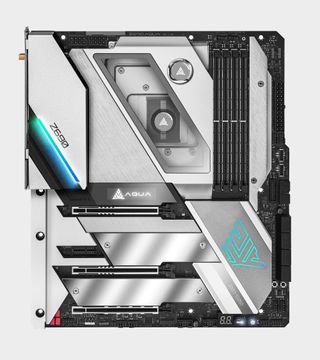
As a technical statement, the Z690 Aqua is amazing. It’s built like a tank, loaded with features, and it deserves to be shown off in a huge windowed case in all its glory. It’s impossible to recommend, hence the score, but with just 500 available worldwide, our recommendation wouldn’t mean a lot anyway.
It’s a showpiece bit of tech and, when viewed as such, I can’t help but love it.
What a motherboard! ASRock’s Z690 Aqua stuns with its attention to detail but its $1,400 price tag means it has little relevance out in the real world.
Chris’ gaming experiences go back to the mid-nineties when he conned his parents into buying an ‘educational PC’ that was conveniently overpowered to play Doom and Tie Fighter. He developed a love of extreme overclocking that destroyed his savings despite the cheaper hardware on offer via his job at a PC store. To afford more LN2 he began moonlighting as a reviewer for VR-Zone before jumping the fence to work for MSI Australia. Since then, he’s gone back to journalism, enthusiastically reviewing the latest and greatest components for PC & Tech Authority, PC Powerplay and currently Australian Personal Computer magazine and PC Gamer. Chris still puts far too many hours into Borderlands 3, always striving to become a more efficient killer.
Sign up to get the best content of the week, and great gaming deals, as picked by the editors.
Thank you for signing up to PC Gamer. You will receive a verification email shortly.
There was a problem. Please refresh the page and try again.
PC Gamer is part of Future US Inc, an international media group and leading digital publisher. Visit our corporate site.
© Future US, Inc. Full 7th Floor, 130 West 42nd Street, New York, NY 10036.












